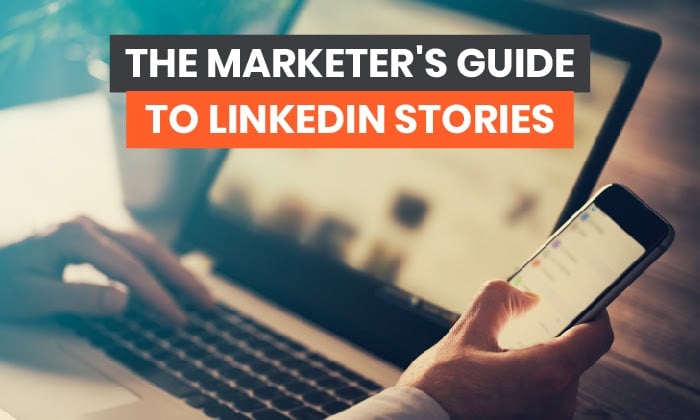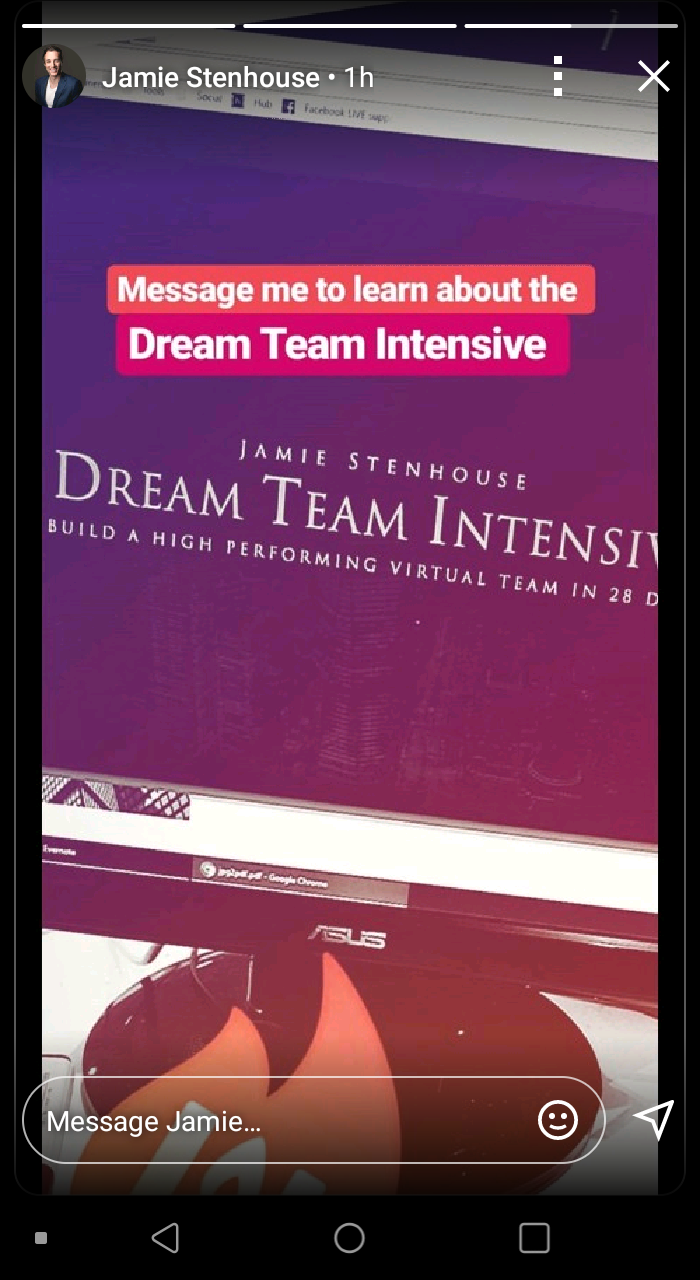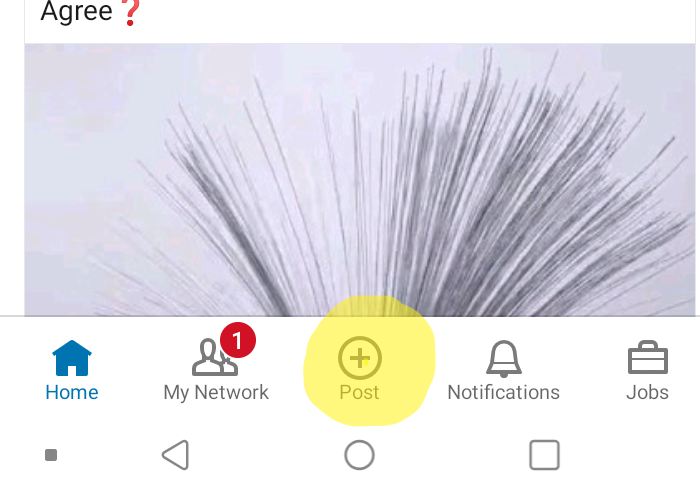
LinkedIn Stories are here, and the first thing you might be thinking is, “How can I use them to grow my business”?
We all see how powerful stories are for brands on platforms like Instagram. Over 500 million people use Stories each day, but how can you use this social strategy to boost your professional reputation on LinkedIn?
In this guide, I’ll show you how to use LinkedIn Stories and share strategies you can start implementing today.
What Are LinkedIn Stories?
If you’ve ever made a story on Instagram, Facebook, or Snapchat, LinkedIn Stories operate in pretty much the same way. You create a short video of up to 20 seconds, and once you upload it, the video is available for people to see for 24 hours, and then it goes away.

Users can post as many Stories as they like, making it easy to quickly jump in, record a quick update with what you’re doing, and then allow your connections to check it out.
So, why stories? Why do I think LinkedIn is starting to roll out something so casual on a platform geared towards networking and digital resumes?
Because we’re living in the “age of sharing,” and the more you share, the bigger your brand becomes. Stories are a great way to share all of those imperfect moments in your professional life, and I think that’s what the Senior Director of Product Management, Pete Davies, is going for.
The format will help kickstart conversations and nurture the relationships that are core to everything that happens on LinkedIn.
Why Should Your Business Create LinkedIn Stories?
Now let’s talk about some of the reasons why you should consider implementing a LinkedIn Stories strategy in your business. If you’ve been using Instagram or Facebook Stories for a while, you’ll likely be able to come up with a plan pretty quickly; if not, here are some reasons to take notice.
Pull Back the Curtain
One of the best ways to generate attention for your business is to show people what’s happening behind the scenes.
Show your network there’s a personality behind the business. This helps create a more personal experience. When people see you’re more than a “brand,” you’ll build the trust that’s so necessary when trying to get someone to do business with you.
Taking this even further, you can use this strategy to give your connections some insight into your process.
For example, if you run a print on demand shirt store, use LinkedIn stories to show people how you make your shirts and why they should choose you over someone else.
There’s a great opportunity here for you to separate yourself from the competition without having to hard-sell anyone.
Document the Hustle
In years past, we were so focused on making everything perfect. We needed to buy the best equipment and do everything to ensure no one ever saw us make a mistake.
Those days are long gone.
We’re living in a world of constant connection, and we can’t be afraid to document what we’re going through as it’s happening. For those of you who are already doing this, that is excellent news. If you’re not, now is the time to get started.
Don’t be afraid to show your connections that you’re a real person with faults. If something is going wrong, do a story and explain to your colleagues what happened and how they can prevent the same thing from happening to them.
Doing this shows authenticity, and people don’t hire a brand; they hire people.
On the flip side, share your triumphs and successes as well. If you just closed on a huge contract with a big client, create a story explaining how it went and what you think you did well.
You don’t have to give away sensitive information, just let your network know what you’re winning, and it might motivate them to reach out and connect with you.
Increase Engagement With LinkedIn Stories
Stories on LinkedIn provide the most significant opportunity for engagement. On Instagram, as much as 25% of users swipe up on branded stories. Now we’re taking this same thought process but moving it to a platform entirely dedicated to business networking.
There’s a lot of power here.
Keep in mind that, even though your stories might not result in a direct sale, you’re generating awareness around you and your brand.
LinkedIn allows you to engage with the people you need to directly talk to for access to new opportunities.
For example, let’s say the Director of Marketing at a company posts a story about their SEO strategy, and you are interested in working with them. Here’s your chance to directly reply to that story with some tips and ideas you’ve used in your own business.
Keep in mind that you may get a generic response to something like this, but you’re increasing the person’s chances of checking out your profile to see what you do. If you’re active on LinkedIn and your profile is well optimized, you just might find a message in your inbox.
How to Create LinkedIn Stories?
Creating LinkedIn Stories is simple. It works the same as every other platform.
You’ll go into your LinkedIn app and click the “post” button at the bottom. Once you do that, you’ll see a new button titled “share a story.”

When you click it, you’ll be able to record a video or take a picture and customize it to your liking.
The story uploads, and once it’s done, you’ll find it at the top of your LinkedIn home with all the stories from your connections. This is a fantastic way to put your name at the top of everyone’s page.
Keep in mind that LinkedIn Stories are only available on the mobile app. You can’t create or view them from your desktop.
What Makes a Successful LinkedIn Story?
If you’re sitting there right now, wondering, “What steps do I need to take to create the best story?” Selling with LinkedIn Stories is easy, and I’ll guide you through it.
Looking at Instagram as an example, 50% of businesses worldwide create an average of one story per month. So, you can see where the low hanging fruit lies here. You have an excellent opportunity to generate a lot of free attention for your business — with the right strategy.
Here are the most important metrics to consider when determining the success of your LinkedIn story.
Grab Their Attention
The first thing you’ll notice about LinkedIn Stories is they don’t offer a preview at the top of the screen like Facebook and Instagram. This makes getting the initial click a bit more difficult.
You can’t create a clickbait thumbnail to get people to click on your story. So, your LinkedIn profile picture needs to get the attention of your audience.
Keep in mind that LinkedIn is a professional network, so use a professional headshot on your profile. This is not the place for a picture of your cat or your car; you need to dress and look the part.
Think about your target audience and dress to get their attention. An agency owner pitching agriculture businesses might not look the same as one pitching boutique coffee shops, right?
Start Strong
The average person only watches 40 to 60% of your story, so you must grab their attention right away. If you start with a boring message, chances are they’ll swipe away and assume your Stories aren’t worth watching.
Consider starting your story with the most exciting part of the video. While you only have 15to 20 seconds, take those first five seconds to speak directly to the camera and call out your audience.
If you’re trying to reach agency owners making $100,000+, call them out right away. Address a pain point or issue they might have within the first five seconds, and you’ll increase the chances of keeping them around for the next 15.
Keep Their Attention
At around the 10-second mark is where you will start losing people. They’ll swipe to your next story or move on to a different profile. You need to hold their attention by keeping it as interesting as possible.
Consider using props, bring in other people, and utilize statistics that draw in your audience and speak to them directly. Every business should have a customer avatar. If you don’t, now is the time to start!
Figure out exactly who your ideal customer is and bring them to life with personality traits, demographic information, pain points, and desires.
You should know exactly who they are, what they want to hear, and what you need to say to make them stick around.
Close It Out
While Stories are meant to be informal, it doesn’t mean you can’t have an objective in mind. You should always be looking for ways to convert the people watching your Stories.
These are great opportunities to get free attention, so make the most of it.
Keep in mind that a lot of people have likely swiped away by the time you get to your last five seconds. That means these people are highly interested in what you’re saying and may want to learn more.
For example, you could turn a blog post you recently posted into a Story. Take the three most important points from the post and highlight them in a story. In the end, tell the viewers where they can find the blog post and prompt them to check it out.
There are a million different options, but you want to have some type of call to action at the end of your story.
You don’t have to ask someone to buy something directly, but you should always tell them what to do next.
Tips on Converting LinkedIn Story Viewers to Clients
If you’re on LinkedIn, I can bet you’re there to get clients. Why else would you use the platform? Networking and building connections are great, but the end goal of those efforts is to add more clients to the database.
Here are a few quick tips to help you get the most out of your LinkedIn story viewers.
Stay on Brand
On Facebook, users move 41% faster on mobile than desktop. While we don’t have data from LinkedIn yet, we can expect the numbers to be similar. You need to be quick in establishing your brand and representing it the right way.
When someone taps your story, they should get hit immediately with something that makes your brand stand out so they’ll remember it.
Even if you’re just quickly recording a story about going for a run before hitting the office, talk about how it impacts your performance at your business.
Provide Value
The best way to convert traffic is by giving something away. You don’t have to overcomplicate this. Provide free information, offer a short how-to, or show them how to solve a critical problem.
Revisit your customer avatar here and think of something that might be on their to-do list. What’s something that your ideal customer hates doing? Chances are it might be the very thing you do and offer to take care of it for them if that’s the case.
Always Have a Plan
Just because LinkedIn Stories are casual doesn’t mean you need to improvise all the time. Never fill the story with something that doesn’t have an objective.
Doing this one time will hurt your brand, and people might just swipe by you because they think you have nothing to offer.
Every time you put something out to your audience, you should have a plan in mind to provide value. Give yourself enough time to plan ahead and even consider developing a content calendar for your LinkedIn stories.
Conclusion
LinkedIn Stories are an exciting addition to the networking platform. Based on what the Senior Director of Product Management said, they’re trying to make LinkedIn appear less intimidating and more informal.
Have you ever had the opportunity to stand out and become an early adopter? Maybe you have, maybe you haven’t. Either way, LinkedIn stories offer a unique chance to jump ahead of the competition and get your content in front of your target audience first.
Why wait? Create your first LinkedIn Story right now and get ahead of the pack!
Have you tried LinkedIn Stories yet?
The post The Marketer’s Guide to LinkedIn Stories appeared first on Neil Patel.
from Blog – Neil Patel https://ift.tt/349gnTb

No comments:
Post a Comment